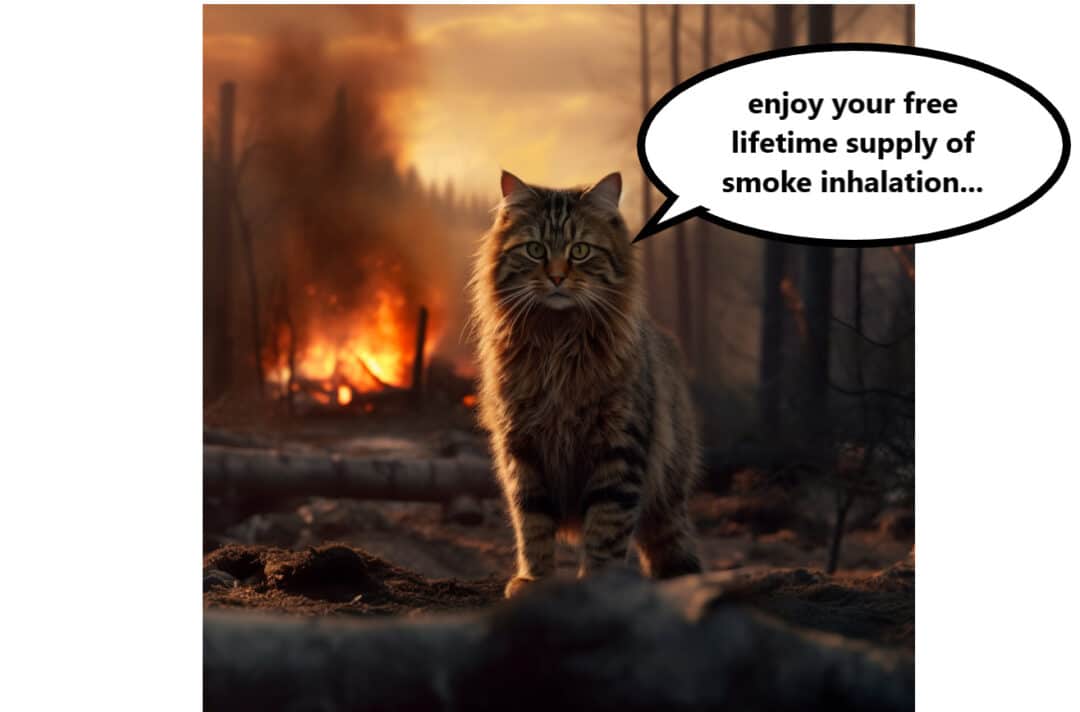Subscribe to Zero-Sum Pfear & Loathing


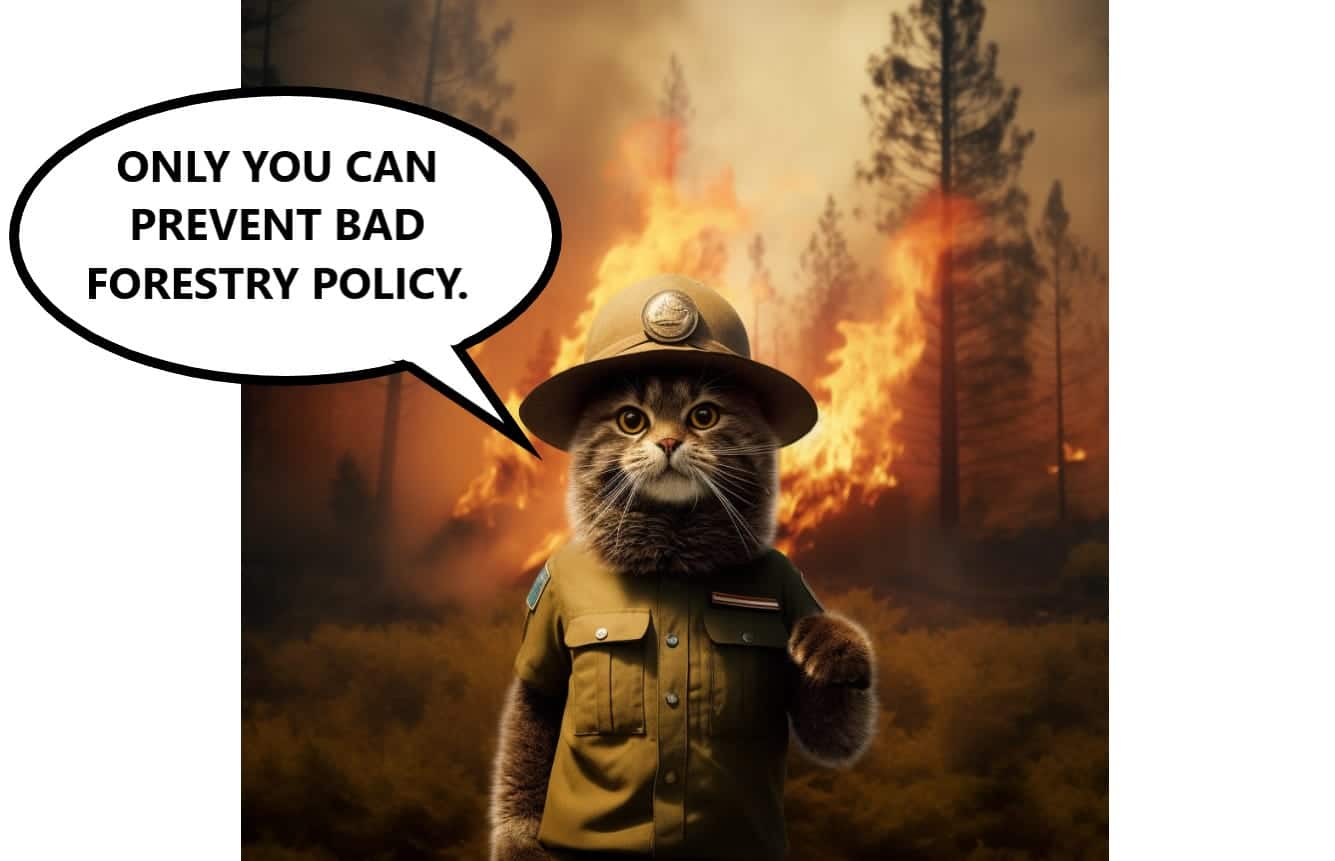
by el gato malo | Jun 10, 2023
forest fires are big, mediagenic events. the pictures are dramatic. the smoke they produce can spread for hundreds even thousands of miles and can make life downwind unpleasant, even deadly for weeks on end.
they are also widely misunderstood and being used to make outlandish claims in favor of “climate policy” that has nothing whatsoever to do with the matter at hand. as ever, data may be used to illuminate or to obfuscate and complete pictures and even modicums of perspective are conspicuously absent.
the politicization of this issue has become intense and as we shall see there are, in fact, politics at play but they are not the politics being so widely and recklessly espoused.
let’s look:
out friends at bloomberg are telling us this story which is a wonderful piece of claims embedding (a common and highly effective propagandistic practice) whereby an article ostensibly about one thing embeds claims about another thing as though they were fact and uses them as a predicate for the other argument.
in this case we have an article ostensibly about insurers fleeing california that blames this upon an “inability to react to and price in climate change” which embeds the presumption that 1. climate change is happening and that 2. this change is the driver of more forest fires. it then goes on to presume that this rise in fires is somehow related to “increased instances of extreme weather.”
bloomie has been going on and on about this as insurers stop writing policies in california because risks and claims are way up and the local regulators are refusing to allow rates to rise to reflect this. this seems like typical california economic denial, but with a side order of physics denial as well because the idea that this is somehow climate change driven (also a tentpole of california policy justification) looks unsupportable as a claim.
basically none of this stands up to scrutiny.
this is the chart that gets trotted out over and over to claim that “forest fires are on the rise.”
it’s certainly dramatic. it looks like ~3mm acres jumped to 7. but there is a great deal more to the story. firstly, this does not look like the shape one would see if the issue were “climate.” it’s basically a step function jump in 2000. that would seem more consistent with some more proximate cause.
secondly, this chart lacks perspective based on its timeframe. (sources)
when one zooms out, the picture looks quite different.
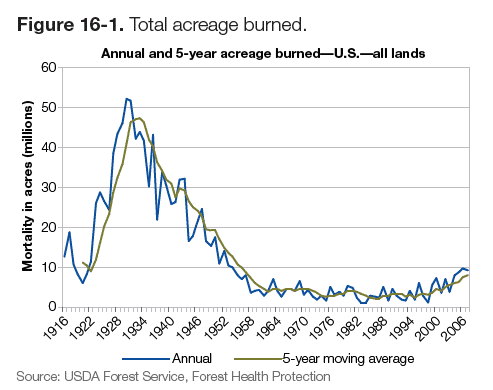
we do still see some uptick, but it’s pretty minor in the face of long term trends. one might also then start to ask some probing questions about the cause of this uptick because there is certainly a case to be made that if it is to be attributed to “global warming” we’d need to see some warming in the regions purported to be affected and that appears a very tenuous claim, especially in the timeframes described.
as described HERE in detail, the US climate network is a mess of data adulteration and even worse data collection. the rural temperature stations have been near eliminated and those that remain have become so urban that the heat island effects of siting are adding several degrees of upward bias in readings in a manner the NOAA is making no effort to control for. they have not even done their own site surveys but as can be seen in the link above, a large scale and high quality citizen project (surfacestations.org) did so and less than 8% of USCRN stations meet NOAA siting guidelines. the error bars are biased upward and constitute multiples of the century scale signal purported to be measured. the data is garbage.
fortunately, we have the CRN reference network, a set of well sited, continuous duration stations. this is the best, clearest, cleanest signal we have in US data using actual thermometers.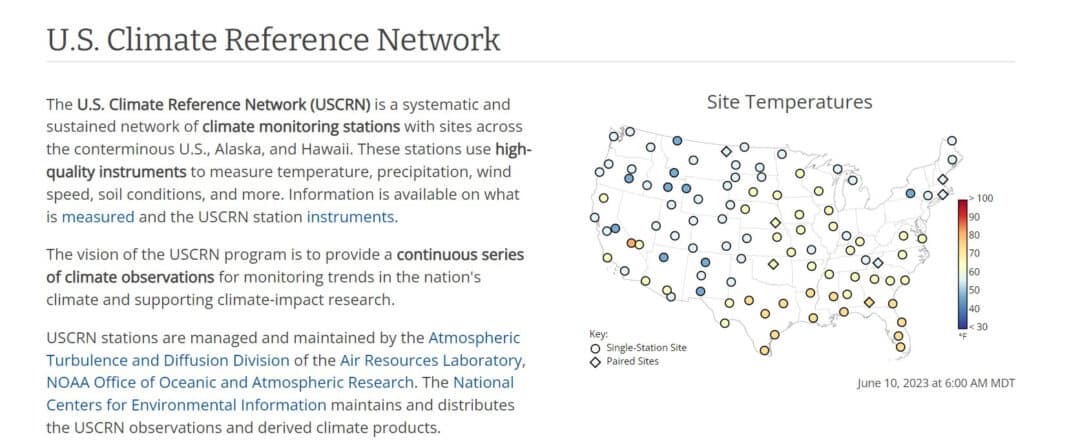
it’s somewhat limited by the fact that it has only been tracked since 2005, but the outcomes are quite provocative.
we’re coming up on 20 years of zero warming trend.
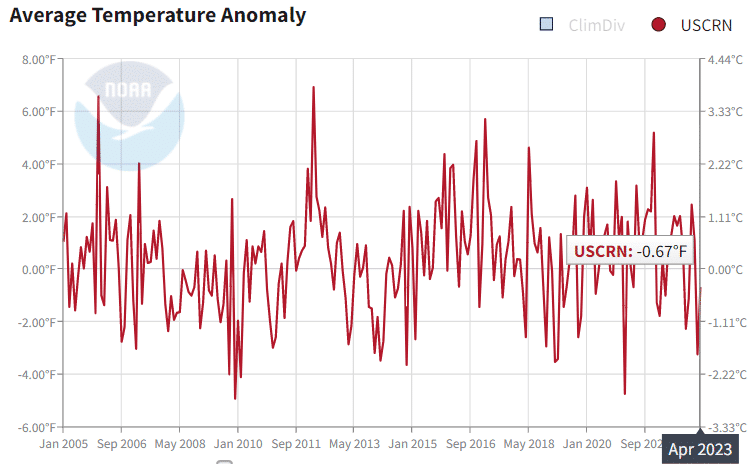
i shall leave the reader to draw their own conclusions about why this dataset is never discussed by the NOAA or climate activists and why they choose instead to frantically foreground the bad data from the larger legacy networks despite the fact that it is so conspicuously contradicted by higher quality measurements, but i’m just seeing little to no way to look at the best data we have and claim the US has been warming over the last couple decades.
the whole move from “global warming” to “climate change” seems a cynical ploy to try to sidestep the real “inconvenient truth”: that the data is stubbornly refusing to conform to the anthropogenic climate change narrative.
not that it stops them from telling it…
now, clearly canada fires are all the rage right now as they happen to be sending smoke to new york who (unlike the mountain west who has been downwind of californa cum mordor in recent years and is getting positively used to having to deal with this every summer) find such outcomes unusual let’s add the great white north to the mix: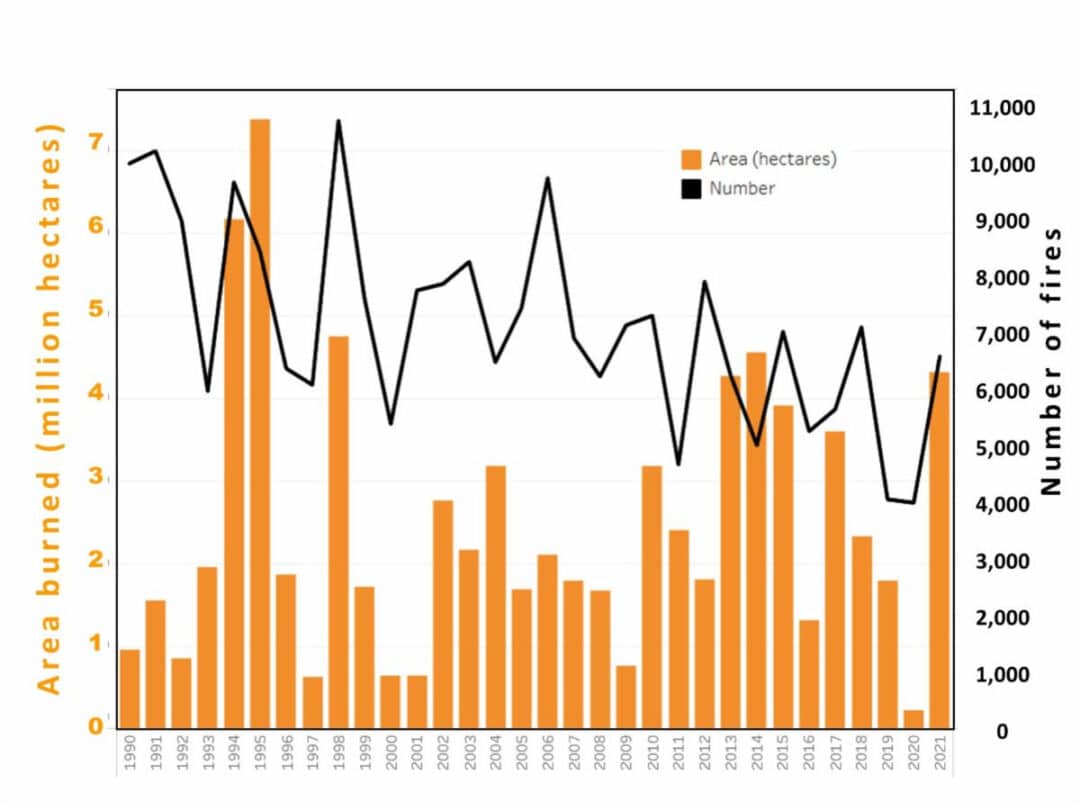
there is really not much discernable trend here (graphically, it gets skewed by the one tall bar in 2021, but consider 2020 before it and the 2 average to something like 3mm)
these fires have been going on for 1000’s of years and are a healthy, natural, and even vital part of these forest ecosystems. they are literal burn ecologies. fire is part of their life cycle.
but don’t take my word for it, let’s ask noted climate change deniers “the canadian forestry department.”
because this is where we start to get to the crux of the issue and where the blame, especially in california, shifts away from “climate” and back onto “groovy gavin’s eco-topia” and it’s mélange of misbegotten eco-fables. (not that he started this trend, he just seems inclined to extend and accelerate it) it’s also worth noting that other states have been considering and adopting policies akin to california, so this policy pratfall is contagious.
the unavoidable baseline fact is this: it is not climate change driving the rise in fires and especially megafires, it’s policy change.
this is an own goal and an avoidable and fixable one.
the key fact here is a simple one: an ounce of prevention is worth a million flambéd acres of cure.
everyone used to know this. the huge drop in fires in the US came from figuring this out. it’s not an exotic technology nor some obscure practice, it’s what used to be the literal core and basis of sound forestry management.
california and many other forest regions like it are burn ecologies. and poorly conceived policy is turning them into tinderboxes.
the basic ecological process is based, even dependent on fire. forests overgrow, dry out, burn, and replenish. the trees themselves have adapted to it.
“Giant sequoia cones are serotinous, which means that fire on the forest floor causes them to dry out, open and release their seeds. This adaptation ensures that the tree times the release of most of its seeds to coincide with fire, which creates ideal conditions for regeneration success.”
and it’s not going to stop by itself. if you want to safely live near these ecosystems, you need to take some action.
what works is thinning forests through logging and small, controlled burns. you need to cut down some of the trees and clear the brush. doing this leaves more water for the trees that remain, keeps them alive and healthy instead of dead and dried out, and clearing the brush removes the kindling that lets the big fires get going.
this is not some wild, untried idea, it had generations of serious, demonstrable success but was largely terminated and/or banned by changes in budget priorities and eco laws to “save the habitats” of the fluffy-butted warbler or whatever other forest critter seemed in peril by, well, turning their habitat into refined fuel for hellscape sized megafires.
perhaps not the greatest trade off for them…
the independent institute has studied this in detail:
lest one be inclined to assume this is some fringe view, let’s check in with “the nature conservancy,” a group dedicated to protecting natural forests who has a compelling plan here:
and the plan involves going back to tried and tested forestry policy. california keeps trying to blame these fires on climate and power lines or lightning strikes, but the real issue is simple:
tree density is WAY too high for safety and they are surrounded by piles of forest floor tinder.
so we get dead forests instead of live ones and massive fires instead of little ones.
the results are not exactly subtle, are they?
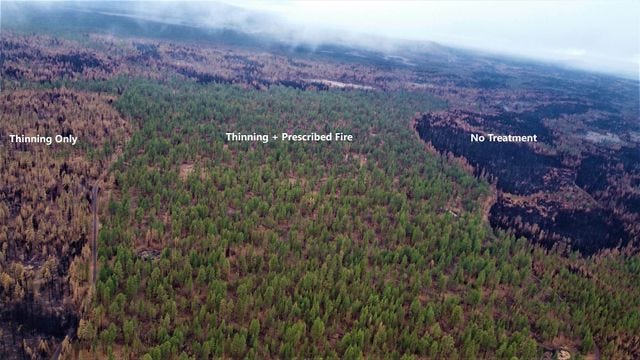
the “cause” of the rise in fire is not the proximate one. it’s that the forests are not being managed and therefore are incredibly susceptible to fire. a “cause” will always emerge, but this is a false framing. it’s like pumping a patient full of immune suppressants for no reason and then blaming “flu” for their sudden sickness.
even all these accusations of arson (some of which are likely true) are only made possible by mismanaged forests. were they cared for as they were in the 60’s, 70’s 80’s, 90’s this sort of malicious activity would not be possible in any serious scope or scale. it’s bad forestry policy that has opened them up to attack.


because this is glaringly, ostentatiously obvious and utterly, easily fixable.
there is nothing tricky or controversial here apart from a media and governmental talking point complex that refuses to acknowledge baseline reality.
so yes, this is 100% a political issue, but it’s not the one it’s being represented as. this is a policy fail. that which worked was abandoned for that which sounded good to a few eco-rubes and now we are all paying the price.
reality is not optional and ecology denial is a very expensive foible.
its time we stopped pretending that there are no trade offs here and began (once more) doing the sensible thing.
consider the alternative:
